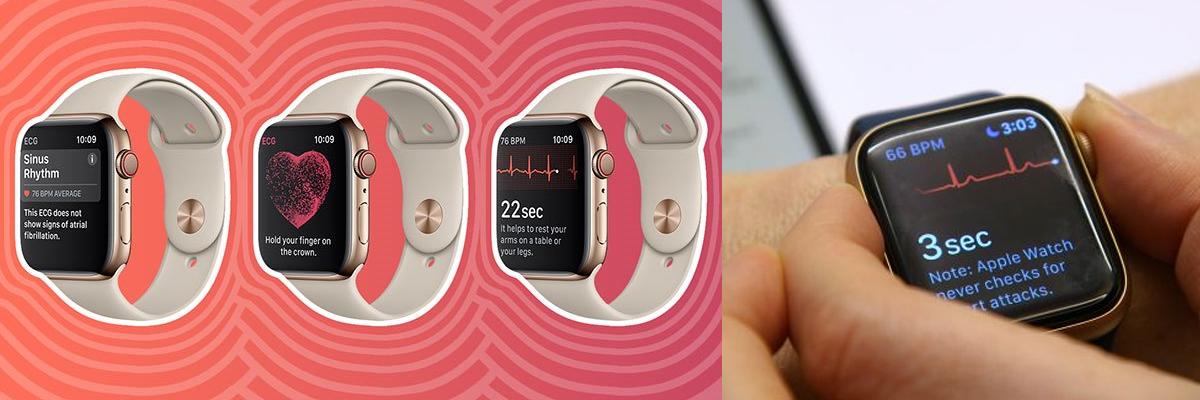Live
- Bad air: 106 shuttle buses, 60 extra Metro trips planned to make Delhiites give up cars
- WHO reports declining monkeypox cases in Congo
- CM Attends Kotideepotsavam on Kartika Purnima
- PKL Season 11: Raiding trio of Devank, Ayan, Sandeep help Patna Pirates rout Bengal Warriorz
- Food waste crisis fuels sustainable practices across APAC food & beverage industry: Report
- AI helps erase racist deed restrictions in California
- ATMIS completes third phase of troops' drawdown in Somalia
- PM Kisan Samman Nidhi scheme bringing smile to Nalanda farmers
- German economy forecast to lag eurozone growth until 2026
- CM Shinde orders stern action against hoarding of onions amid rising prices
Just In

Apple Watch Series 4 will now help users in the US take an electrocardiogram ECG right from their wrist, capturing heart rhythm in a moment when they experience symptoms like a rapid or skipped heart beat and helping to provide critical data to physicians
San Francisco, Dec 7: Apple Watch Series 4 will now help users in the US take an electrocardiogram (ECG) right from their wrist, capturing heart rhythm in a moment when they experience symptoms like a rapid or skipped heart beat and helping to provide critical data to physicians.
"New electrodes in Apple Watch Series 4 now enable customers to take an ECG directly from the wrist," Apple said in a statement on Thursday.
"Starting today, the ECG app on Apple Watch Series 4 marks the first direct-to-consumer product that enables customers to take an electrocardiogram right from their wrist," added the Cupertino-based tech giant.
The irregular rhythm notification feature on Apple Watch can now occasionally check heart rhythms in the background and send a notification if an irregular heart rhythm that appears to be atrial fibrillation (AFib) is identified.
When left untreated, AFib is one of the leading conditions that can result in stroke, the second most common cause of death around the world.
"Apple Watch has helped so many people around the world and we are humbled that it has become such an important part of our customers' lives," said Jeff Williams, Apple's Chief Operating Officer.
"With the release of these heart features, Apple Watch takes the next step in empowering people with more information about their health," he added.
Apple worked with the US Food and Drug Administration (FDA) for several years to receive "De Novo" classification for the ECG app and the irregular heart rhythm notification.
Both the features are now available as part of a free update to watchOS 5.1.2.
This is how it works.
To take an ECG recording at any time or following an irregular rhythm notification, open the new ECG app and hold your finger on the Digital Crown.
As you touch the Digital Crown, the circuit is completed and electrical signals across their heart are measured.
"After 30 seconds, the heart rhythm is classified as either AFib, sinus rhythm or inconclusive. All recordings, their associated classifications and any noted symptoms are stored securely in the Health app on iPhone. Users can share a PDF of the results with physicians," Apple informed.
All recordings, their associated classifications and any noted symptoms are stored securely in the Health app on iPhone, said Apple.
Using the optical heart sensor in Apple Watch Series 1 or later, the irregular rhythm notification feature will occasionally check the user's heart rhythm in the background for signs of an irregular heart rhythm that appears to be Fib and alerts the user with a notification if an irregular rhythm is detected on five rhythm checks over a minimum of 65 minutes.
"The role that technology plays in allowing patients to capture meaningful data about what's happening with their heart, right when it's happening, like the functionality of an on-demand ECG, could be significant in new clinical care models and shared decision making between people and their healthcare providers," said Nancy Brown, CEO of the American Heart Association.
The ECG app's ability to accurately classify an ECG recording into AFib and sinus rhythm was validated in a clinical trial of around 600 participants.
The irregular rhythm notification feature was studied in the Apple Heart Study with over 400,000 participants, said Apple.

© 2024 Hyderabad Media House Limited/The Hans India. All rights reserved. Powered by hocalwire.com







